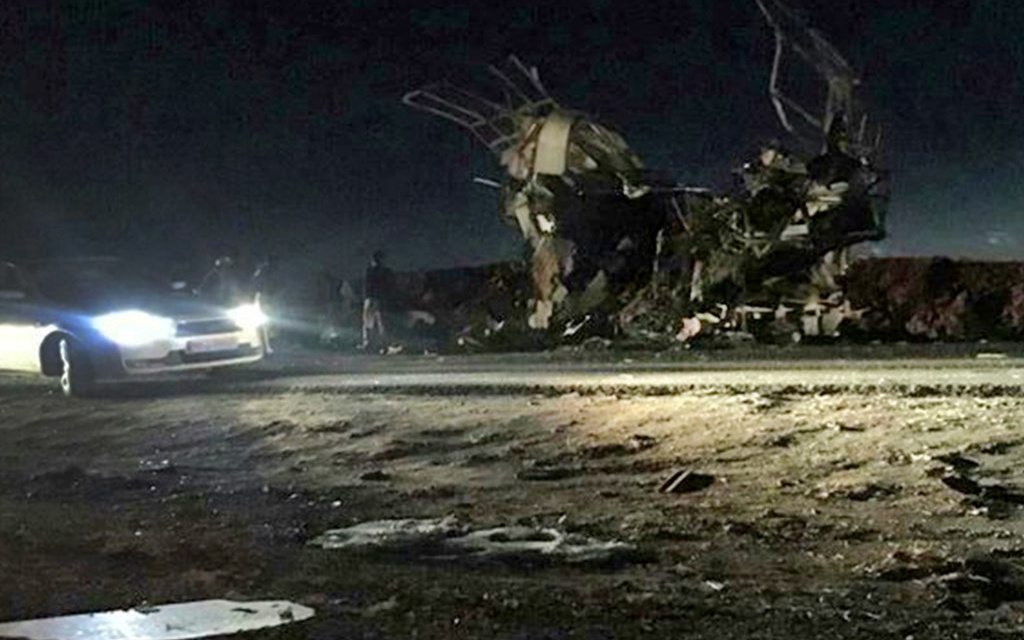Scene of a roadside bomb that killed 27 Revolutionary Guards and wounded 17 aboard a bus in southeastern Iran, February 13, 2019
The Supreme Leader’s declaration of a “Second Phase of Islamic Revolution” in Iran was overtaken on Wednesday by a suicide bombing which killed 27 Revolutionary Guards.
A roadside bomb targeted a bus transporting troops on the road between the cities of Zahedan and Khash in Sistan-Baluchestan Province in southeastern Iran, near the Pakistan border. Another 17 Guards were wounded.
Fars, a Guards-linked site, said the bombing was claimed by the Baluch separatist group Jaish ul-Adl. The faction has carried out a series of assassinations and abductions of Iranian personnel in recent years.
Last week one Guards soldier was killed and five wounded in an attack on a Basij paramilitary base in Sistan-Baluchestan. On January 29, three police officers were injured by a bombing in the provincial capital Zahedan, and in December, a suicide bombing in the port city of Chabahar killed two police officers and wounded 42 people.
Iran Daily, Feb 4: Attack on Paramilitary Base Kills 1, Injures 5 Revolutionary Guards
Jaish ul-Adl was founded in 2012, two years after the Baluch separatist faction Jundullah dissolved following the executions of its leaders. It soon began a campaign of shootings, bombings, and kidnappings in the border area.
Revolutionary Guards commander Ali Fadavi said Wednesday, “Our response in defense of the Islamic Revolution will not be limited to our borders….The enemies will receive a very firm response from the Revolutionary Guards like before.”
Supreme Leader’s “2nd Phase of Revolution”
Earlier in the day in Tehran, the Supreme Leader gave the closing speech for 10 days of celebrations of the 40th anniversary of the Islamic Revolution.
Amid economic problems and US sanctions, Ayatollah Khameni depicted an Islamic Republic dedicated to “freedom, ethics, spirituality, justice, independence, dignity, rationality, [and] brotherhood”. He said it “strongly adheres to its principles and it is highly sensitive to its frontiers in relation to its rivals and enemies”.
Iranian nation’s glorious Revolution—which is the greatest & most popular revolution of the new era—is the only revolution that has safeguarded the dignity & nobleness of its slogans and has now entered the 2nd phase of self-development, society-making and civilization-creating.
— Khamenei.ir (@khamenei_ir) February 13, 2019
Proclaiming that the Revolution had brought “stability” to Iran, advancing technology and scientific research, he defied recent history by hailing “the popular participation in political matters such as elections” as well as “confronting internal seditions” and waging “the fight against the Arrogant Front”.
The Supreme Leader spoke in general terms rather than addressing immediate, specific concerns. However, in one key passage, he alluded to the economic difficulties:
The main defects include economic reliance on oil; government interference in sectors of the economy that do not fit into the sphere of government’s responsibilities; relying on imports rather than domestic strength and potentials; very limited exploitation of the country’s human resources potentials; defective and unbalanced budgeting; and finally lack of consistency in executive economic policies, disrespecting priorities and excessive and even wasteful expenses in parts of state organizations.
He acknowledged the outcomes such as “the high rate of unemployment among the youth” and “low income of lower classes”, while insisting of his “Resistance Economy” for self-sufficiency amid sanctions.


“Iranian nation’s glorious Revolution—which is the greatest & most popular revolution of the new era—is the only revolution that has safeguarded the dignity & nobleness of its slogans and has now entered the 2nd phase of self-development, society-making and civilization-creating”
Obviously, he has ears of some idiots listening